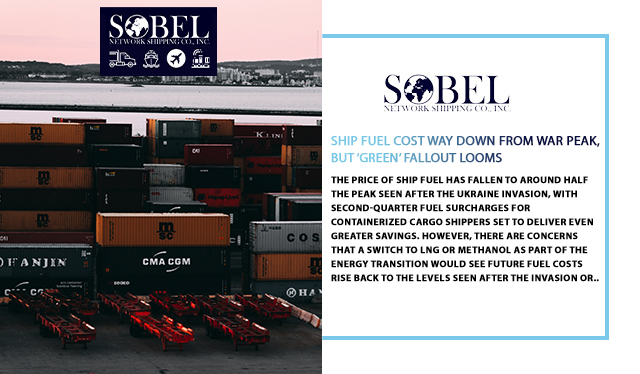The price of ship fuel has fallen to around half the peak seen after the Ukraine invasion, with second-quarter fuel surcharges for containerized cargo shippers set to deliver even greater savings. However, there are concerns that a switch to LNG or methanol as part of the energy transition would see future fuel costs rise back to the levels seen after the invasion or worse. Ship owners and operators are saying that cargo shippers will ultimately pay for the higher price of “green” fuel, suggesting that if shippers don’t cover the higher price, there will not be a shipping energy transition because vessel owners and operators will not pay for it. While the spread between very low sulfur fuel oil (VLSFO) and high sulfur fuel oil (HSFO) is shrinking, the price of LNG fuel remains 62% higher than HSFO in Rotterdam, although bunkering with LNG is now 62% more expensive than with HSFO, a reduction from the previous average of three times the cost.
Despite the number of dual-fuel container ships being built and a small number of dual-fuel tankers and dry bulk carriers, virtually all of these dual-fuel vessels are designed to burn either traditional fuel oil or LNG. A small but growing minority of dual-fuel newbuilds are designed to burn traditional fuel oil or methanol, not LNG. Speakers at the 17th Annual Capital Link International Shipping Forum have discussed this issue, with Semiramis Palios, CEO of dry bulk owner Diana Shipping, stating that LNG is too expensive, and Mark O’Neil, CEO of Columbia Shipmanagement, highlighting the practical hurdles to the fuel transition for shipping. He questioned whether a fossil-fuel-free and carbon-zero future is possible given the peripatetic and fragmented nature of the shipping sector, and the geopolitical situation currently faced.
Green methanol, which remains unclear as to whether the private sector can make pricing work without government intervention, is also problematic from a sourcing perspective. Drewry has estimated that a switch to green methanol would increase fuel costs by about 350%. Container shipping giant Maersk is leading the push for green methanol with 19 methanol-fueled newbuildings on order, with related capital expenditures totaling almost $3 billion. The availability of the green fuel required to power these vessels is a challenging task, and while Maersk has signed MOUs with nine green methanol producers, greater production and scale is needed. Chairman Robert Maersk Uggla believes that the change will not happen just because of private initiatives and is calling on governments to provide incentives and support for the development of green fuels to help make them competitive.


